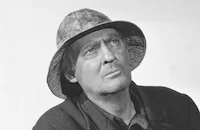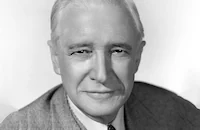One Man's Journey

Brief Synopsis
Cast & Crew
John Robertson
Lionel Barrymore
May Robson
Dorothy Jordan
Joel Mccrea
Frances Dee
Film Details
Technical Specs

Synopsis
Dr. Eli Watt, once an ambitious physician with a promising New York practice, returns with his young son Jimmy to his hometown of Willow Springs, widowed and broke. After mortgaging the family house to unsympathetic banker John Radford, Eli sets up practice in Willow Springs and is soon called on to deliver a baby. When the mother dies after giving birth to a girl, the father, McGinnis, accuses Eli of malpractice and refuses to care for the baby. Eli brings home the child, whom he names Letty, and, while tending tirelessly to the medical needs of the highly critical townspeople, who pay him only with home-grown food, rears her as his own. Four years later, a reformed McGinnis begs for the return of his daughter, and against the admonitions of Sarah, his housekeeper, Eli sends Letty home with her natural father. When a smallpox epidemic ravages Willow Springs many years later, Eli singlehandedly curbs the disaster and improves living conditions in the rural New England community. Although commended by the county medical board for his efforts, Eli continues to practice in obscurity, while a now-grown Jimmy prepares to attend medical school in Vienna. Letty, meanwhile, falls in love with Radford's son Bill, who after a night of making love to Letty, is injured in an automobile accident. Eli assists in an operation to save Bill's arm, and his skills come to the attention of Dr. Tillinghast, a respected surgeon from New York. Impressed by Eli's abilities, Tillinghast invites his colleague to work and study with him in the city. Although greatly tempted by the offer, Eli misses his opportunity to go to New York when, instead of catching the train, he chooses to help a pregnant Letty, who has attempted suicide because Bill's father has denounced her as a gold digger. Six years later, Jimmy has earned his medical degree and Letty and Bill have married and had another child while Eli has remained the country doctor. Devastated by the realization that Bill is involved with another woman, Letty refuses to fight for her life after a difficult third pregnancy. Sensing the couple's troubles, Eli saves Letty's life once more by gently reuniting the family at Letty's bedside and inspiring her to fight. After being honored at a prestigious banquet, Eli then saves Jimmy's engagement to Joan Stockton by showing his ambitious, compassionless son the link between human kindness and effective medicine.

Director
John Robertson
Cast

Lionel Barrymore

May Robson

Dorothy Jordan

Joel Mccrea

Frances Dee

David Landau
Buster Phelps
June Filmer
James Bush
Oscar Apfel

Sam Hinds

Hale Hamilton
Dorothy Gray
John Ince
Forrest Taylor
Frank O'connor
Crew
Willard Barth
S. H. Barton
Pandro S. Berman
Gilbert Brown
William Clothier
Lester Cohen
Merian C. Cooper
D. A. Cutler
Al D'agostino
Charles Kerr
Gaston Longet
Jack Mackenzie
George Mcgonigle
Russell Metty
Joe Noriega
Samuel Ornitz
Van Nest Polglase
Sam Redding
Arthur Roberts
Max Steiner
S. James Thornburn
E. B. Woolfan M.d.

Photo Collections
(Pressbook images courtesy of the Academy of Motion Picture Arts and Sciences)
Videos
Movie Clip



Hosted Intro
Film Details
Technical Specs

Articles
One Man's Journey
"I'd rather play a doctor than pay him," Lionel Barrymore quipped regarding his role of Dr. Eli Watt in One Man's Journey. Barrymore, the first of his illustrious family to appear in films, had signed in 1926 with MGM, the studio with which he remained closely associated for the remaining 27 years of his movie career. But he also appeared occasionally on loan-out for RKO movies, including One Man's Journey and another picture produced by Pandro S. Berman in 1933, Sweepings.
Dr. Watt, whose wife has died in bearing him a son, abandons city life to return to the small rural town where he was raised to begin a new life as a "country plug" who accepts potatoes and eggs in payment for his services. In addition to inspiring his son Jimmy (Buster Phelps as a child, Joel McCrea as an adult) to follow him into the medical profession, Watt raises a girl (Dorothy Jordan) whose mother has died in childbirth and who grows up to lead a troubled life. (Jordan secretly married Merian C. Cooper in May 1933, a month before filming began.) Also joining the household is a feisty volunteer housekeeper (May Robson).
Jimmy develops into a successful if selfish surgeon who takes his beautiful fiancée, Joan (Frances Dee), for granted until his father makes him see the error of his ways. The story reaches an inspirational conclusion when everyone realizes at last just how important and helpful the good doctor has been to his extended family and the community at large, and he is honored with a testimonial dinner.
The screenplay was developed from a short story by Katharine Haviland-Taylor, "The Failure" (incorrectly credited by the studio as simply "Failure") that ran in the November 1932 issue of American Magazine. The characters played by Jordan and Robson were not in the story but were created by the screenwriters. The movie's pre-Code era is revealed in such touches as the Jordan character's out-of-wedlock pregnancy.
Working in uncharacteristic understatement as Watt, Lionel Barrymore creates a warmly sympathetic portrait of a man who does good simply because it never occurs to him to do anything else. Mordaunt Hall wrote in The New York Times, "Mr. Barrymore lends amazing sincerity to his role...He is never too fatigued to attend to the ills of those who are unable to pay for medical attention. He is always even-tempered, in fact a lovable character." Time magazine's reviewer considered that Barrymore acted "so shrewdly that Katharine Havilland-Taylor's lachrymose little story has moments of validity."
Director John S. Robertson had enjoyed his greatest success with the 1920 Dr. Jekyll and Mr. Hyde, starring another Barrymore - John. In One Man's Journey he handles his entire cast sensitively. It's difficult to imagine a more appealing young couple than McCrea and Dee as they appear here. The two were married on October 20, 1933, a month after the film's release. They remained a couple until McCrea's death in 1990.
One Man's Journey was remade by director Garson Kanin as A Man to Remember (1938) - another entry in TCM's collection of "lost" RKO films.
Producer: Merian C. Cooper (Executive Producer), Pandro S. Berman
Director: John S. Robertson
Screenplay: Lester Cohen, Arthur Kober, Samuel Ornitz, from story by Katharine Havilland-Taylor
Choreography: Jack MacKenzie
Film Editing: Arthur Roberts
Art Direction: Van Nest Polglase, Al D'Agostino
Cast: Lionel Barrymore (Eli Watt), May Robson (Sarah), Dorothy Jordan (Letty McGinnis), Joel McCrea (Jimmy Watt), Frances Dee (Joan Stockton), David Landau (McGinnis) Buster Phelps (Jimmy Watt, Age 6).
BW-73m. Closed captioning.
by Roger Fristoe

One Man's Journey
Quotes
Trivia
Notes
[Editor's note: One Man's Journey was not viewed prior to the publication of its entry in the AFI Catalog of Feature Films, 1931-40. This entry was revised after a 2007 viewing of the film.]
The working title of the picture was The Doctor. Within the film, the passage of time is related by close-up shots of diary entries written by "Eli Watt." RKO borrowed Lionel Barrymore and May Robson from M-G-M for the production. Modern sources include Russ Powell, Colin Kenny, Frank Ball, Lucille Ward and Lloyd Ingraham in the cast.
In 2007, this film, along with five other RKO productions from the 1930s, was broadcast on the Turner Classic Movies (TCM) cable network, the first public showing of the picture in more than seventy years. For additional information on the TCM broadcast, please consult the entry above for Double Harness. RKO made another adaptation of Katharine Haviland-Taylor's short story in 1938. That film, A Man to Remember, was directed by Garson Kanin and starred Edward Ellis and Anne Shirley (see entry above).















